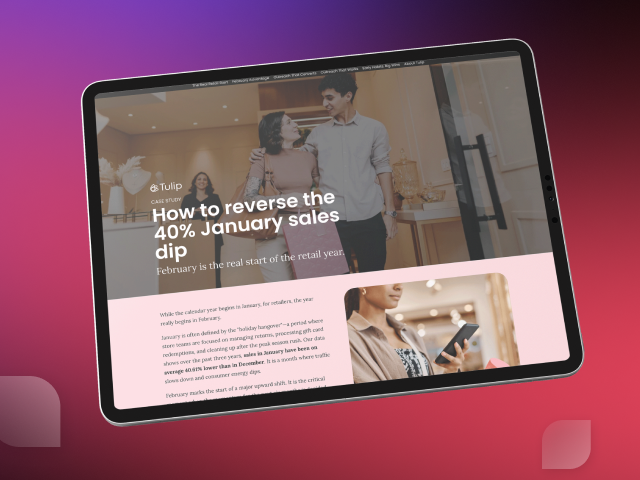Practical use cases of AI to improve retail CX
AI is changing retail fast, and knowing how and where to use it is important before you put money into it.
This blog shows how AI can make customers happier, personalize online shopping, and make stores work better.
You’ll find clear ideas for using AI that really help your business. We’ll look at where AI shines and, just as important, where people are still key.
Where retailers should be using AI
AI is great at making customer interactions better and making operations smoother, especially online, with virtual reality experiences, for training, and when used with clienteling.
AI can create exciting and personal experiences for your customers, connecting the online world with the real world.
Augmented/virtual reality programs
AI can make the online experience personal by letting them try out products virtually before buying. For example, IKEA’s app lets you see how furniture looks in your own home. Another cool example is The Fitting Room, where you can make a virtual version of yourself with your exact body shape and skin tone. Then, you can see exactly how clothes would look on you without even trying them on. This makes customers happier and can even mean fewer returns.
AI-powered training programs
Investing in your sales team is investing in your brand. AI can create personalized tutors that cater to each employee’s learning style, teaching them about products in a way that makes sense to them.
This could mean an AI system that figures out what an employee is good at and what they need help with. Then, it gives them special lessons or practice games to fix any gaps in their product knowledge or improve their sales skills. For instance, an AI tutor could quiz an employee on new product features, let them practice talking to tough customers, or give them instant feedback on how they’re doing. This leads to employees who know more and, in the end, provide better customer service.
AI-driven clienteling
AI isn’t about getting rid of people; it’s about making them even better. When AI works with your sales team that use clienteling tools, it can make customer interactions more personal. Here are just two examples of how AI can enhance clienteling:
- Personalized messages for everyone: AI can help your team write personal messages to customers quickly and easily, while still following your brand’s rules. This means your customers get messages that feel made just for them, which builds stronger relationships.
- Customer info at their fingertips: AI can look at tons of customer information and quickly pull out key facts for your sales team. This helps them quickly understand who a customer is and make the experience special for them. This leads to more meaningful talks and more sales.
Where retailers shouldn’t be using AI
While AI has huge potential, there are important areas where the human touch is still super important. Relying too much on AI in these areas can break trust and make the special feeling of shopping in a store, or even your brand’s image, less valuable.
Humans are social, and there’s a clear value in talking face-to-face, especially when it’s about hobbies you love or big purchases.
“Humans are extremely important— that is where personalized attention and trust, and expertise matter. Maybe it’s a depth of hobby, where you know you’re talking to people who know a lot about that specific topic, it matters quite a lot, the human is in that loop,” said Elena Yunusov, Executive Director of Human Feedback Foundation and AI Strategy Leader, in this webinar.
Building trust and fostering community
People are drawn to other people because of trust. There’s nothing that can truly replace advice from a friend you trust. In a world that’s getting more and more artificial, real human interaction becomes even more valuable.
As Mark Cuban puts it, the proliferation of AI, particularly AI video, will lead to an explosion of face-to-face engagement, events, and jobs because people won’t know what’s real anymore. He calls it the “Milli Vanilli effect”.
Providing a customer-service component
When you’re offering a service or adding a service part to your product, human interaction is incredibly important.
This is where personal attention, trust, and real knowledge matter. Some brands call their employees “Experts,” like Apple, or “Specialists,” like Lowe’s. They do this because they know customers want to talk to a person for deep questions and fully trust these individuals for advice.
Think about buying cosmetics; customers want to interact with someone who is genuinely obsessed with makeup and can offer expert advice on products for specific skin types, what colors look best on what skin tones, and other personalized recommendations. This level of nuanced understanding and shared passion is difficult for AI to replicate at this point in time.
Making high-value purchases
When a consumer is making a significant purchase, like designer clothing, high-end jewelry, or even luxury cars, the human-to-human connection can be the crucial factor that helps them commit to the large investment.
“I think that it is really helpful to hear the human voice when you’re making a really, really big purchase,” said Kirill Moisyeyev, Co-founder & CEO of The Fitting Room, in this webinar. “There’s something about that human to human connection where it helps them get the consumer over the edge to finally fork over that large amount of capital.”
People tend to trust other people more readily for guidance through these complex and emotionally resonant decisions. Luxury brands, in particular, need to focus on this human-to-human connection as a very clear brand distinction. While AI might be effective for guiding customers through less expensive or more straightforward purchases, for high-value items, leaning into human interaction makes more sense for the high-end brand experience.
A real-world example: Tulip AI
Tulip believes in AI enhancing the human connection, not replacing it. Tulip AI uses all the rich and special information in the Tulip Clienteling app to give helpful improvements that make sales work better.
One specific problem sales associates face is spending too much time trying to write the perfect message for each customer. They often have to go through long lists of company templates, which isn’t very efficient. Tulip AI helps by acting like a virtual assistant for sales associates, streamlining daily tasks. It offers intelligent message writing suggestions that generate tailor-made messages in split seconds.
The AI even learns how a specific associate usually talks to a specific customer, so the messages quickly become personalized and easier for the associate to send. This also frees up time, letting associates focus on giving amazing, personal customer experiences that build loyalty.
Another way Tulip AI helps is by making customer data easy to use. Associates often have to manually dig through information, but Tulip AI automatically pulls relevant customer data so there’s no need for manual sifting efforts. This leads to instant profile summaries and tools to find and group customers.
Tulip AI also assists store managers and retail operations leaders in identifying hidden trends and behaviors among both customers and sales associates. Its AI-powered customer searches, grouping tools, checks on communication, and automatic data insights help managers make employees perform better and reach important sales goals.
Tulip AI makes the retail experience better by keeping humans at the center, with AI working behind the scenes.
Bringing it all together
To wrap up, while AI offers amazing chances for retailers to invent new things and work more efficiently, it’s important to know its limits.
The best retail plans will leverage AI to boost operations and digital experiences. At the same time, they’ll strongly support and protect the priceless human connections that build trust, create community, and drive sales.
Learn more
To learn more about practical use cases of AI in retail, hear from our expert panel in this webinar How AI enhances human connections.
If you want to see a demo of Tulip AI in action, book a meeting with our team.
Recommended reads
If you liked this blog, check out these other titles:
- Webinar: How AI enhances human connections
- Press release: Tulip unveils Tulip AI for Clienteling
- Webinar: Clienteling is now for every retailer


